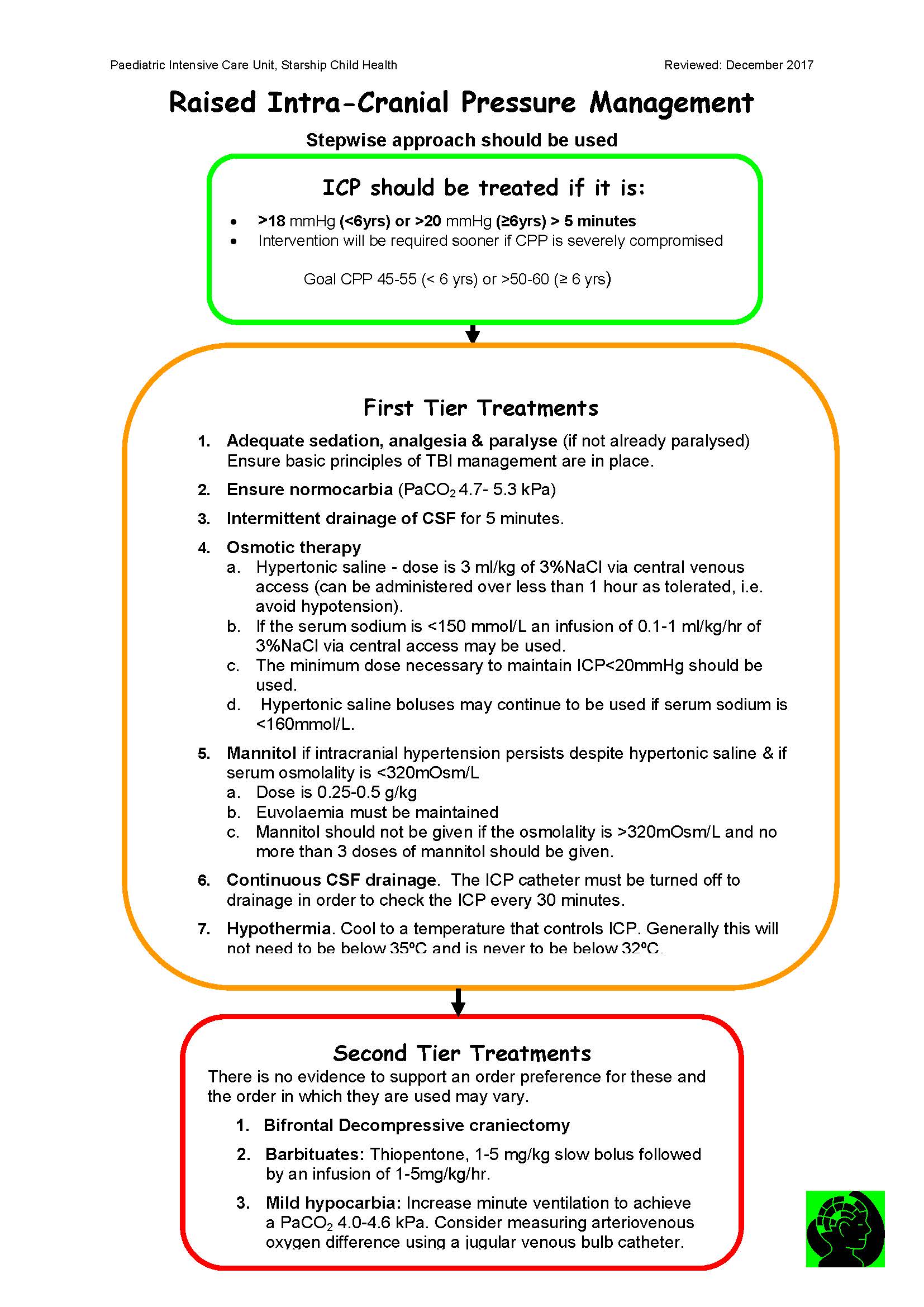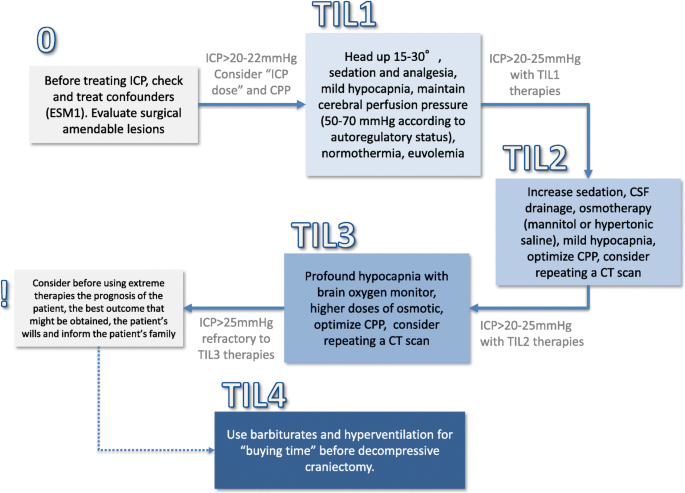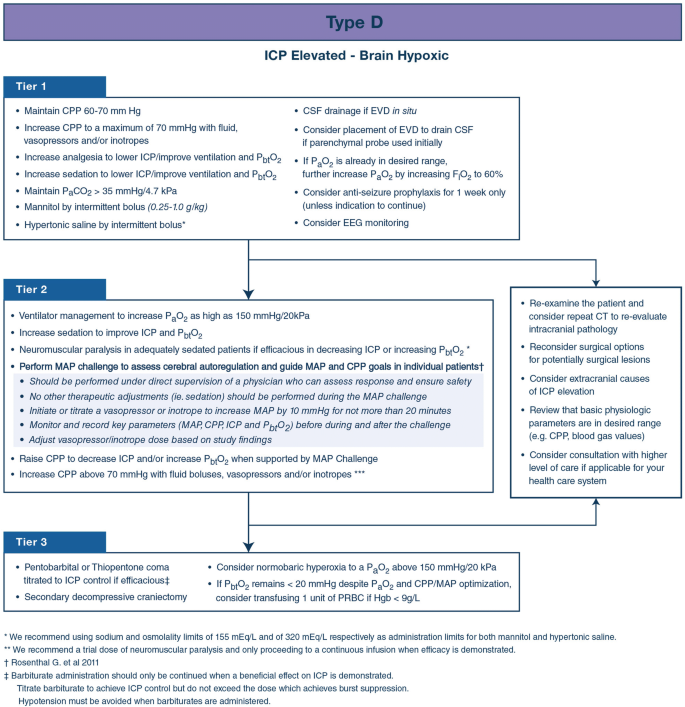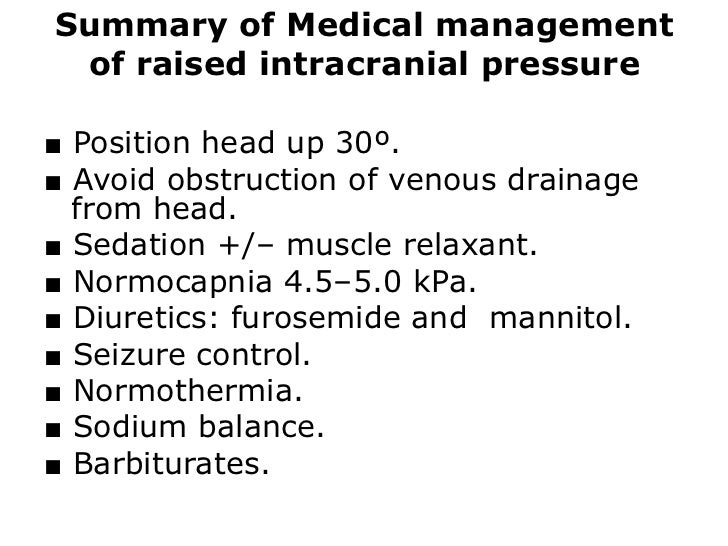This can be done by slowing down production of it within the ventricles of the brain. Management of elevated icp is in part dependent on the underlying cause.
 Management Of Intracranial Hypertension Neurologic Clinics
Management Of Intracranial Hypertension Neurologic Clinics
Icp 20mmhg for 5mins see patient urgently check transducer height icp waveform and consider bis.

Management of icp. The ideal treatment of raised intracranial pressure is to find out the cause and treat it accordingly for example csf diversion for hydrocephalus drainage of an abscess removal of a clot or a tumor. Elevated intracranial pressure icp is typically defined as icp sustained above 20 mm hg. To provide guidance on the management of raised icp on neurosurgical icu for non anaesthetic trained junior doctors and new icu doctors scope.
It reflects neither a standard of care nor a. This can lead to an injurious shift of the brain termed herniation. Medical options for treating elevated icp include head of bed elevation iv mannitol hypertonic saline transient hyperventilation barbiturates and if icp remains refractory sedation endotracheal intubation mechanical ventilation and neuromuscular paralysis.
Critical management of raised icp aim. Treatment of intracranial pressure icp elevation is central to the management of patients with severe traumatic brain injury tbi. It may be a medical or surgical emergency can cause cerebral ischemia brain herniation and death and requires aggressive treatment to reduce the risk of morbidity and mortality 1 2 3.
In this article we will discuss the management of increased intracranial pressure icp so let s get started. Treatment of the underlying cause. One way to manage icp is to reduce the volume of cerebrospinal fluid csf in the intracranial space under the skull.
Drug therapy administer inj mannitol 25 it acts in two ways 1. A major concern associated with intracranial injuries is the management of intracranial pressure icp a resulting factor of a tbi which facilitates into intracranial hematoma and or cerebral edema. Consensus based class iii evidence it provides management recommendations based on combined expert opinion.
Initial pharmacologic management for icp elevation includes interventions for pain and agitation and the use of osmotic diuretics and hypertonic saline hts. Each therapy can effectively reduce icp to normal ranges but is not without risk. Our modern and comprehensive stbi management protocol is designed to assist clinicians managing stbi patients monitored with icp monitors alone.
Management goals identifying and treating the underlying cause of increased icp maintaining adequate perfusion and oxygenation to the brain 31. All l level 3 adult patients in neurosurgical icu with monitoring of icp. 1 3 the volume of the intracranial contents often increases following tbi as a result of hemorrhage cerebral edema and hydrocephalus.
 Management Of Raised Intracranial Pressure In Children With Traumatic Brain Injury Kukreti V Mohseni Bod H Drake J J Pediatr Neurosci
Management Of Raised Intracranial Pressure In Children With Traumatic Brain Injury Kukreti V Mohseni Bod H Drake J J Pediatr Neurosci
 Algorithm For The Management Of Severe Head Injury Accepted By The Download Scientific Diagram
Algorithm For The Management Of Severe Head Injury Accepted By The Download Scientific Diagram
 Critical Care Management Of Increase Intracranial Pressure Ppt Video Online Download
Critical Care Management Of Increase Intracranial Pressure Ppt Video Online Download
 Management Of Raised Icp Icp Intracranial Pressure Nm Neuromuscular Download Scientific Diagram
Management Of Raised Icp Icp Intracranial Pressure Nm Neuromuscular Download Scientific Diagram
 Head Injury Raised Intracranial Pressure Management In Picu
Head Injury Raised Intracranial Pressure Management In Picu
 How I Manage Intracranial Hypertension Critical Care Full Text
How I Manage Intracranial Hypertension Critical Care Full Text
 Stepladder Management Of Increased Icp Enls Protocol Peripheral Brain
Stepladder Management Of Increased Icp Enls Protocol Peripheral Brain
 Presentation And Management Of Raised Intracranial Pressure Ppt Video Online Download
Presentation And Management Of Raised Intracranial Pressure Ppt Video Online Download
 Raised Intracranial Pressure Paediatric Emergencies
Raised Intracranial Pressure Paediatric Emergencies
 A Management Algorithm For Adult Patients With Both Brain Oxygen And Intracranial Pressure Monitoring The Seattle International Severe Traumatic Brain Injury Consensus Conference Sibicc Springerlink
A Management Algorithm For Adult Patients With Both Brain Oxygen And Intracranial Pressure Monitoring The Seattle International Severe Traumatic Brain Injury Consensus Conference Sibicc Springerlink
 The Algorithm For Treatment Of Increased Intracranial Pressure Icp In Download Scientific Diagram
The Algorithm For Treatment Of Increased Intracranial Pressure Icp In Download Scientific Diagram
 Neurosurgery Management Of Raised Intracranial Pressure Dr Mazn Buja
Neurosurgery Management Of Raised Intracranial Pressure Dr Mazn Buja

